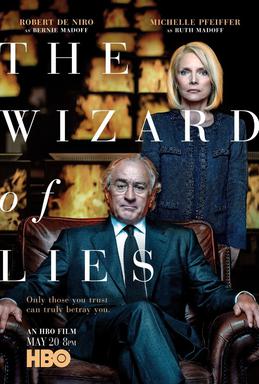For as much as America celebrates innovation, entrepreneurship, and business success, it also revels in exposing the (real or exaggerated) dark side of that success. The greed narrative is one that shows that the desire to do better, reach higher, or earn more comes at a great cost, be it laws broken, lives ruined, personal integrity destroyed, and/or relationships torn asunder. It should be a tired trope at this point, but it is kept relevant (if not exactly fresh) by a seemingly endless parade of real-life inspirations.
Wall Street fraudster Bernie Madoff and McDonald’s founder Ray Kroc are two such inspirational figures whose lives were recently given the greed narrative treatment. Both 2017’s The Wizard of Lies and 2016’s The Founder aim to shine some light on the price paid for financial success. But just as these two cases are separated by time, circumstance, and several orders of magnitude (Madoff’s empire crashed and burned while McDonald’s continues to thrive), so too do their respective films diverge.
Based on the book of the same name by financial reporter Diana Henriques, The Wizard of Lies is a small-screen (HBO) production that boasts a big-screen pedigree. Robert DeNiro stars as Madoff, Michelle Pfeiffer plays wife Ruth, Alessandro Nivola and Nathan Darrow are sons Mark and Andrew while Barry Levinson directs (His son Sam is the screenwriter). DeNiro, who has been toiling in forgettable comedies and B-films lately, reminds audiences what he is capable of when given a weightier role. He portrays Madoff, who infamously bilked investment clients in a long-running $65 billion Ponzi scheme, as confident, calm, and compartmentalized to the extreme though also self-aware and ultimately broken. Pfieffer is more than solid in support – Ruth comes across as a tragic figure – and Mark and Andrew emerge as reluctantly complicit foils to their scheming father.
Intimate in its characterization and slickly shot, The Wizard of Lies suffers from misplaced narrative focus. So much emphasis is given to the implosion of the Madoff family that the film largely glosses over the greater impact of Bernie’s misdeeds. The Big Short showed that it was definitely possible to expose the workings of Wall Street chicanery without losing the audience. The disappointing reluctance to do so here renders The Wizard of Lies a stylish, at times affecting, but ultimately hollow film.
Whereas The Wizard of Lies documents a fall, The Founder focuses largely on an ascent. In 1954, Ray Kroc (Michael Keaton) is a struggling milkshake mixer salesman from the Midwest who finds that a client in California has high demand for his company’s machines. After meeting the McDonald brothers Mac (John Carroll Lynch) and Dick (Nick Offerman), he is greatly impressed by their restaurant’s speedy, efficient operation and convinces them to franchise it. Though Ray successfully markets the concept to franchisees, he finds himself unable to get ahead financially. His plans to cut costs by using powdered milkshakes and to buy and lease the land the restaurants sit on put him at odds with the brothers but hold the potential for runaway success.
Directed by John Lee Hancock (The Blind Side) and scripted by Robert Siegel (The Wrestler), The Founder starts as a paint-by-the-numbers, hard-work-makes-good origin story before going noticeably darker. Though it thankfully avoids hagiography, it also steers clear of Social Network-style immolation of its subject. Keaton gives a convincing performance, portraying Kroc not as a moustache-twirling schemer but as a beleaguered dreamer whose ambition clearly got the better of his ethics. And though the film contains several notable omissions (don’t look for Ronald here), it still works to document the moves that transformed McDonald’s into a juggernaut. However, it suffers from precisely the opposite problem of The Wizard of Lies. It is at such an emotional remove from its subjects’ personal lives (Laura Dern’s role as Kroc’s first wife is a thankless, one-note role and the McDonald brothers are only shown vis-à-vis their relationship to Kroc) that it makes it difficult for the audience to invest in these characters.
Greed narratives are unlikely to fall out of favor any time soon. The best of them offer unorthodox storytelling and complex characterization; the worst of them treat their subjects as props in a predictable morality play. Both The Wizard of Lies and The Founder fall somewhere in the middle, boosted by strong lead performances but hampered by sins of omission.
The Wizard of Lies: 7.25/10
The Founder: 7.25/10


No comments:
Post a Comment